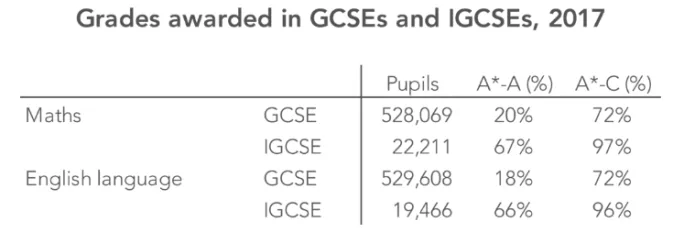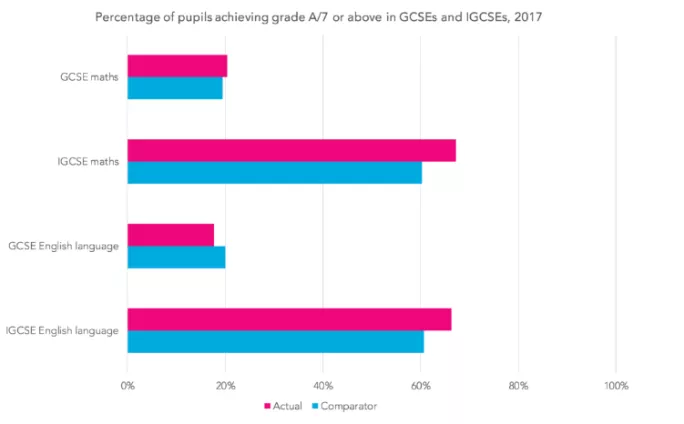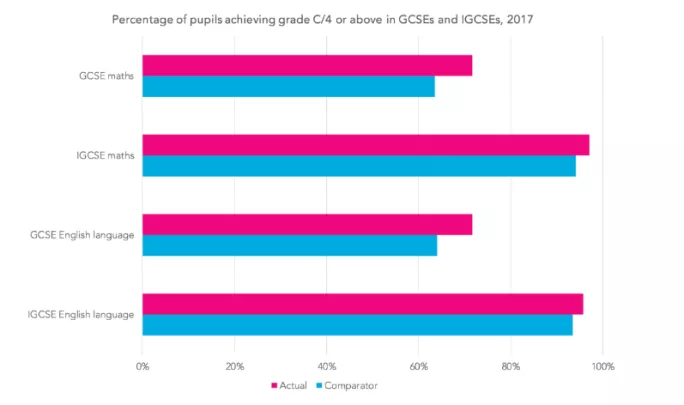- Home
- IGCSEs ‘not graded as severely’ as new GCSEs
IGCSEs ‘not graded as severely’ as new GCSEs

IGCSEs are not graded as severely as reformed GCSEs, a new analysis by a respected education thinktank suggests.
With independent schools allowed to take the IGCSE but state schools barred from doing so, the findings by FFT Education Datalab will fuel concerns that privileged pupils are being given an unfair advantage in the exam system.
“IGCSE” is a term used as shorthand for a family of alternative key stage 4 qualifications that are provided by a number of exam boards.
State schools used to be able to take IGCSEs until a decision was made by the government in 2014 to remove the qualifications from official league tables. However, many private schools continue to take them.
In a blog published today, FFT Datalab looked at whether the introduction of reformed GCSEs meant that IGCSEs now represented an easier qualification.
GCSEs were reformed with the intention to make them “tougher”, and FFT Datalab examined whether there was evidence that IGCSEs were now less severely graded in comparison.
Attainment ‘far higher in IGCSEs’
Taking data from summer 2017 and the first year of reformed GCSEs graded 9-1 in English and maths, Datalab found that “attainment in IGCSEs was far higher than in reformed GCSEs”.
“Two-thirds of pupils achieved grade A*-A in IGCSEs in maths and English language, whereas the fraction achieving the equivalent (grades 9-7) in reformed GCSEs was more like one in five,” the blog says.
However, a higher proportion was to be expected given that the “overwhelming majority” of entries for IGCSEs were in independent schools, where attainment is generally higher.

To analyse whether there would be such a disparity in attainment if those who took IGCSEs had taken reformed GCSEs instead, FFT Datalab looked at pupils’ results in English and maths alongside their results in old-style A*-G GCSEs which they had taken in other subjects in summer 2017.
Modern foreign languages - which the blog says tend to be more severely graded - and minority subjects were excluded from the analysis.
With most pupils taking GCSEs in more than one other subject, a comparator subject was picked at random.
The analysis found that “more A*-A grades were awarded in IGCSEs in English language and maths than we might expect given the comparator based on other subjects”, while “the equivalent grades in reformed GCSEs were broadly in line with expectations”.

The same effect was not evident looking at A*-C grades, where “slightly more were awarded in both IGCSE and reformed GCSE English language and maths than we might expect given the comparator”.

The blog concludes: “At the top end of the distribution, perhaps IGCSEs are indeed not graded quite as severely as reformed GCSEs… there looks to be something in it.”
Earlier this year, a Tes investigation found that found some universities were offering relatively lower requirements for alphabetically graded IGCSEs than for the numerically graded reformed GCSEs.
Register with Tes and you can read two free articles every month plus you'll have access to our range of award-winning newsletters.
Keep reading with our special offer!
You’ve reached your limit of free articles this month.
- Unlimited access to all Tes magazine content
- Save your favourite articles and gift them to your colleagues
- Exclusive subscriber-only stories
- Over 200,000 archived articles
- Unlimited access to all Tes magazine content
- Save your favourite articles and gift them to your colleagues
- Exclusive subscriber-only stories
- Over 200,000 archived articles



